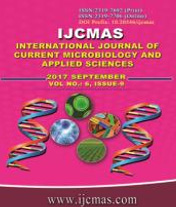


 National Academy of Agricultural Sciences (NAAS)
National Academy of Agricultural Sciences (NAAS)

|
PRINT ISSN : 2319-7692
Online ISSN : 2319-7706 Issues : 12 per year Publisher : Excellent Publishers Email : editorijcmas@gmail.com / submit@ijcmas.com Editor-in-chief: Dr.M.Prakash Index Copernicus ICV 2018: 95.39 NAAS RATING 2020: 5.38 |
A field trial was conducted to study the effect of bio-inoculation, growing media and transplanting dates on fruit yield, quality and post-harvest soil health in sweet pepper. Bio-inoculation resulted in significant increased yield (265.43 q/ha) and quality (vitamin C-114.89 mg/100g) with reduced incidence of fruit rot (5.61 %) and fruit borer (3.02 %) vis a vis corresponding values of 240.17 q/ha, 110.28 mg/100g, 6.55 % and 3.65 %, for un-inoculation. Additionally, bio-inoculation significantly increased availability of NPK (384.95, 81.37 and 391.33 kg/ha) with improved microbial population than untreated plots (369.26, 76.62 and 372.44 kg/ha). Growing media used for raising seedlings showed no significant effects on these parameters excepting enhanced microbial count in soilless plots (102.16 × 105 cfu/g) over soil medium (98.83 × 105 cfu/g). Transplanting on April, 05 recorded maximum yield (326.69 q/ha), TSS (5.29 ºB), ascorbic acid content (128.86 mg/100g) with minimum incidence of fruit rot (4.94 %) and fruit borer (2.53 %) comparing late transplanting. The study concluded that bio-inoculated plants developed from seedlings evolved in either of the growing media when transplanted on an earliest date i.e. April, 05 instigated upgraded pepper yield and quality with good buildup of post-harvest nutrient status.
 |
 |
 |
 |
 |